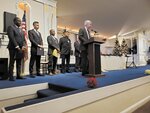Early Monday, hundreds of Rhode Islanders navigated a frozen Rhodes on the Pawtuxet parking lot for a breakfast honoring the Reverend Martin Luther King Jr., as well as eleven Rhode Island students …
This item is available in full to subscribers.
We have recently launched a new and improved website. To continue reading, you will need to either log into your subscriber account, or purchase a new subscription.
If you are a current print subscriber, you can set up a free website account by clicking here.
Otherwise, click here to view your options for subscribing.
Please log in to continue |
|


Early Monday, hundreds of Rhode Islanders navigated a frozen Rhodes on the Pawtuxet parking lot for a breakfast honoring the Reverend Martin Luther King Jr., as well as eleven Rhode Island students earning scholarships in his name.
The Ministers Alliance of Rhode Island Dr. Martin Luther King, Jr. Scholarship Breakfast
is now in its 40th year. This year, eleven students were awarded scholarships of $5,000 for their achievements in academics, and their works in their communities and their churches.
The theme for the morning’s event was “Anchor the past, embrace the present, envision the future.”
President of the alliance Rev. Howard M. Jenkins Jr. spoke on what he hoped those in attendance would take with them from the morning.
“Reflecting on what Dr. MLK means to us as individuals, us as an ethnicity, us as a community, and also us as the fabric of our country,” he said. “Dr. Martin Luther King, though he was an African American, he looked beyond that. He looked at the heart of passion that people have in regards to equality and making sure that we’re doing the right things in regards to civil rights and equity for all.”
When asked how he felt America was performing in that regard, he replied “We have a ways ago, I think. If we step back, COVID highlighted and put a spotlight on the inequities that still exist, but it also helped us to have a platform and statistics to look at so you know, this is where we need help, this is where we need assistance, this is where change needs to happen. So it becomes the responsibility of community leaders, advocates, people of color to continue the battle cry regarding what we are to do.”
The breakfast was well attended by members of Rhode Island government, including the governor and lieutenant governor, as well as all four of Rhode Island’s congressional delegation. Each was invited on stage to congratulate the recipients of the scholarship and share some words.
Governor McKee highlighted the importance of education in the fight for equality. He spoke on initiatives taken by the state through Learn 365 RI to improve academic outcomes in Rhode Island schools, focusing on reading and math skills, as well as attendance.
“Dr. King's dream included a vision of a society where education was a vehicle for change and a bridge to understanding,” McKee said. “Let's embrace this vision and work collaboratively to create educational environments that empower our youth to become compassionate and active participants in the pursuit of justice.”
Lieutenant Governor Sabina Matos spoke of the progress made in Rhode Island in recent years towards having a government which more accurately resembles the actual demographics of the state. She points to her own office, the general officers of Rhode Island, in which two of the five are people of color. She also took a moment to acknowledge Congressman Gabe Amo, who in 2023 was elected the first black man to represent Rhode Island in the U.S. House of Representatives.
“It takes all of us to make this progress, but we have to take a moment to celebrate that we’re making progress. So I just want to say thanks to each and every one of you who has been sacrificing and working for years to make this progress.”
Rev. Carl Jefferson introduced the federal delegation after a resounding call to the attendees to take an active role in creating the kind of material change Dr. King spoke of being necessary to achieve true equity in this country.
Jefferson said “Reverend Dr. King, who was a prophet before his time, stated that the time has come for an all out war on poverty. He stated that the rich nation, our nation, the United States of America, the richest nation in the world must use our vast resources of wealth to develop the underdeveloped and school the unschooled.”
He continued “Ultimately a great nation is a compassionate nation, he stated and so we have to continue to be compassionate.”
Senator Jack Reed reiterated education as a vital tool in the fight for equality. He highlighted an effort he led to acquire $200,000 in federal funding for low income children in Rhode Island to take swimming lessons, swimming being a skill which people of color in America have historically had fewer opportunities to learn due to segregation and lack of access to facilities.
He also spoke on the significance of preserving voting rights in America. He spoke on his resolve towards passing the John R. Lewis Voting Rights Act, which would limit states’ and other jurisdictions’ abilities to make changes to voting practices.
“In a democracy it’s getting people to vote, not stopping them, that keeps the democracy,” Reed said.
Senator Sheldon Whitehouse reiterated the need for voter protections, saying the United States Supreme Court has undermined the Voting Rights Act, one of King’s greatest accomplishments.
Whitehouse stressed the need for all to take part in ensuring a healthy democracy, and thanked those in attendance for their efforts. He made reference to one of King’s most famous quotes, saying “The arc of the moral universe bends toward justice because of the work of human beings.”
Congressman Seth Magaziner urged those in attendance to use their power in the pursuit of justice. He asked those in attendance to support education, to fight against book banning in libraries, to support equitable healthcare, and to protect voting rights.
Magaziner said that progress has always come at great risk, but that “people have been willing to be agents, to use their power in pursuit of justice, so let us find that same strength, let us find that same power of the almighty within all of us and let’s use it for good.”
Congressman Gabe Amo’s speech was last, and most anticipated.
He spoke of being humbled to stand before this assemblage, saying “I stand on the shoulders of so many in this room.”
Amo quipped “As you probably know, I have this new job with a lot of new colleagues.”
He continued, “When I was thinking about the theme of this weekend, I thought about one of Dr. King's queries towards the end of his life. Where do we go from here? Chaos or Community? This is the title of his last book and it consumed King. How do we make the right choice when it seems like running a fork in the road?”
Amo laid out the many roads he sees Americans needing to walk down to achieve a better community. He spoke of dignity for those experiencing homelessness, improved health outcomes, reducing race and economic disparity, ending gun violence, and protecting the rights of voters.
Amo pointed out King’s stance that equality is achieved through political power as well as economic progress. He said “Remember, the March on Washington was fully entitled the March on Washington for Jobs and Freedom. So we must pursue both and to have achieved democracy we need to make sure that everybody can thrive with those goals in mind. Jobs and Freedom.”
Amo said “King said only when it is dark enough can you see the stars. The stars are here, the stars are out there. We just have to work hard to make them close.”
The morning concluded with scholarships awards to the eleven students of universities in Rhode Island. One of the recipients, Phanuel A. Okouta, a student a Pawtucket resident and a student at the University of Rhode Island spoke of King’s legacy, saying “Rev. Dr. King was also a true example of what being “Christ-like” was. He was loving and caring just like Jesus. Dr. King dedicated his very short life to try and bring awareness to social injustice.”
Comments
No comments on this item Please log in to comment by clicking here